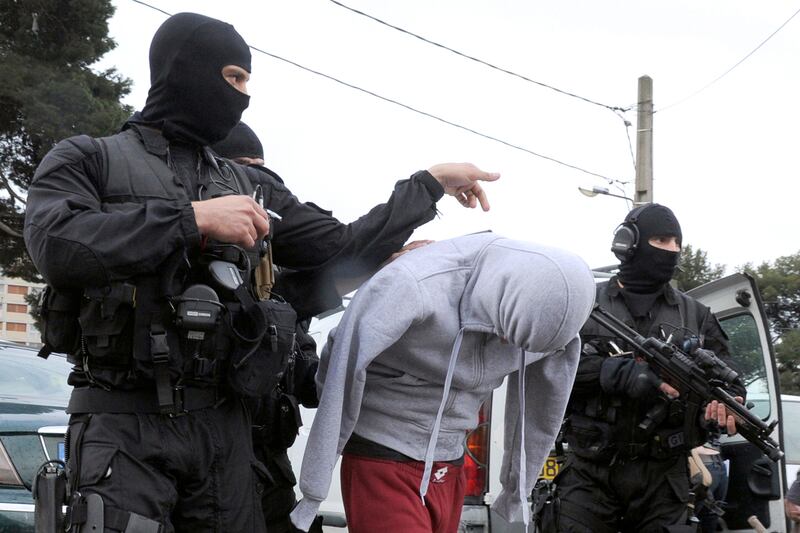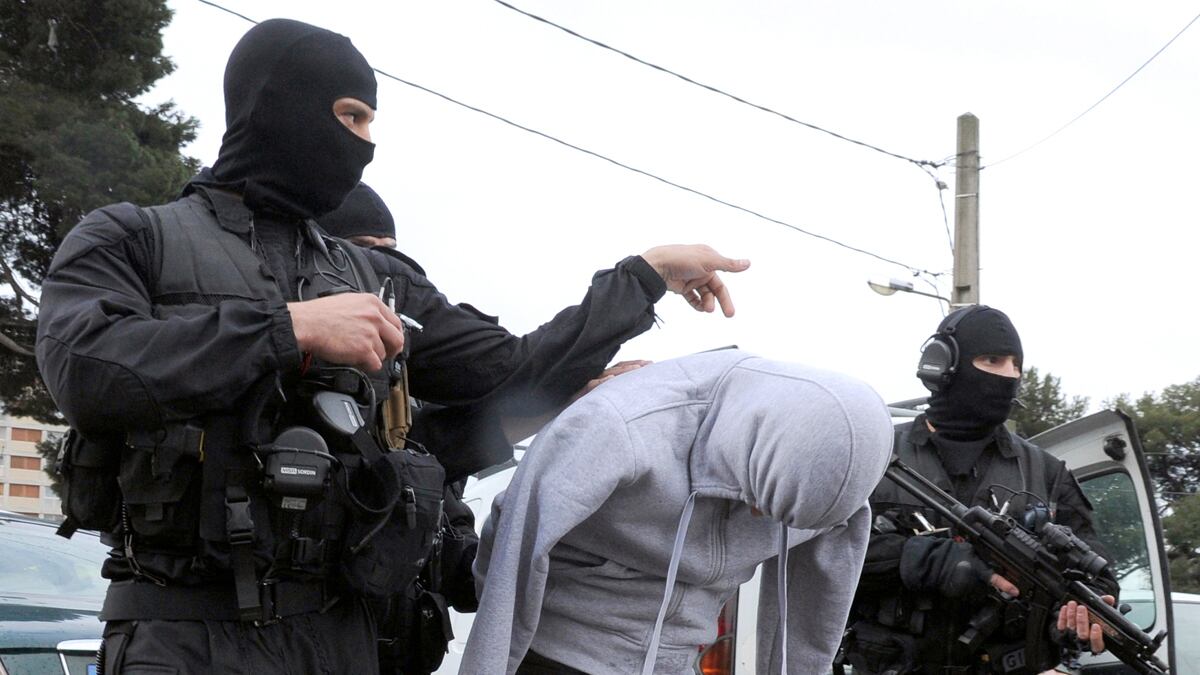You remember the scene at the end of the movie Casablanca, of course, when Claude Rains, playing the French police chief, wants to cover up his complicity in the crime just committed by his friend Humphrey Bogart. As more cops arrive on the scene Rains, completely at ease with his own cynicism, orders them to “round up the usual suspects.”
That is what the French government has been doing since the tragic, horrifying, and embarrassing murders of three French soldiers, a rabbi, and three Jewish children in and around Toulouse last month. But as it tries to obscure its past mistakes, it may well be complicating future investigations.
The latest arrests came in the early hours of Wednesday morning, when 10 radical Islamists suspected of alleged terrorist ties or sympathies were picked up in just about every corner of the country, from Roubaix in the north to Marseille in the south. Five others were thrown out of France in recent days, and another 13 were charged with participation in a “terrorist enterprise.” Not one of those is alleged to have had any connection at all with Mohamed Merah, the 23-year-old Toulouse shooter.
“The government shows its firmness against radical Islam,” headlined the left-leaning daily Le Monde last night. “Sarkozy’s warning to Islamist associations in France,” proclaimed the front page of Le Figaro this morning. Earlier, Sarkozy vowed that people who visit jihadist websites would be liable to arrest. His blunt message: zero tolerance for radical Islam. And as the hard-fought presidential campaign against challengers on the right and left enters its final weeks before voting starts on April 22, that seems to be working. Ever since the Toulouse killings, Sarkozy has been climbing in the polls.

Yet while these arrests and proclamations may be good politics—may even help to obscure the phenomenal intelligence failure that allowed the Toulouse shooter to carry out his nine-day killing spree in the first place—the headline-grabbing measures of today may weaken defenses against terrorist attacks in the future, and not only in France.
A senior American intelligence officer notes that jihadist websites, for instance, are one of the best sources of information about wannabe terrorists. Many so-called lone wolves get themselves worked up online before they ever take action—or, indeed, instead of taking action. And many of those who chat with them are undercover cops, in fact. “Facebook is great,” says the intelligence officer. “It’s one of the best things we’ve got going for us. Some of these crazy guys are actually crazy enough to say what they want to do.” Threatening arrest for anyone who frequents those sites is only going to make the crazies harder to find.
On the streets, there is always tension in law enforcement between the desire to arrest suspected bad guys, and the desire to leave them free—but under surveillance—so the cops can get a better picture of their contacts and organizations while building a more solid case against them. Optimally, some of the bad guys can be turned into police informers or spies.
Police sources have told the French press they were frustrated by the post-Toulouse arrests of people associated with a group called the Knights of Pride (Forsane Alizza). Prosecutors were building a case against them and believed that eventually they might present a real—rather than theoretical—threat, according to sources interviewed by the satirical and investigative weekly Le Canard Enchainé. But the wave of arrests left relatively scanty evidence. “We hit them too early,” said one French counterterror operative.
The risk, of course, is that if the cops wait too long they will be hoodwinked or “smoked,” as the French say, which is clearly what happened with Mohamed Merah. An Interior Ministry document obtained by the French television station M6 appears to show that Merah was first identified as a potentially dangerous Islamist in 2006, when he was barely 19 years old.
The document describes him as “able to travel and to provide logistical assistance to fundamentalist militants.” According to Le Canard Enchainé, Mohamed as well as his older brother Abdelkader were suspected of hanging out with a well-known group of jihadists in Toulouse, who were implicated in efforts to smuggle fighters from France into Iraq. In 2007, Mohamed was picked up by the police at the Spanish frontier, when he went to meet with Salafists south of the border. And, as is now well known, he visited Afghanistan and the Afghanistan-Pakistan region twice in the last 18 months before his shooting spree.
In November of last year, Merah seemed to be cooperating willingly with a French intelligence officer in Toulouse who called him in for an interview. She was the same intelligence officer who tried to talk him into surrendering after the cops laid siege to his apartment in the wake of his killing spree. She had to listen to him behind the door bragging about having joined al Qaeda, and, whether that was true or not, boasting about how he’d fooled her.
After almost a day and a half, a police sniper killed Mohamed Merah during a climactic shootout. The intelligence officer had failed with him on all fronts. “He smoked the lady totally,” says a security consultant close to the interior ministry. “[Merah] had no beard, there was no change in his attire, he still looked like a little criminal, he was having sex with girls.” In short, he did just what he needed to do to deceive the cops until it was too late. (Don’t we remember how un-“Islamic” the 9/11 hijackers appeared to their neighbors in America?) “It was the human factor, the good old human factor,” says the same source.
But does the story really end there? The French press has been full of speculation that Mohamed Merah had actually been recruited as a police informer. His profile would have made him a likely candidate for that sort of work, and if he were on the payroll in some fashion, that might explain why the police were so slow to try to arrest him. French officials have repeatedly denied that was the case.
But what of his older brother, who is now in jail under investigation for complicity in the Toulouse killings? Abdelkader Merah would have an even better profile as an informant: he walked and talked and dressed like an “in-the-middle Salafi,” as one police source puts it. He was devoted to fundamentalist doctrine, but only on the fringes of violent jihad. No firm evidence has turned up so far to substantiate such suspicions about his earlier cooperation with police, which would be explosive in the current electoral environment.
What’s clear is that, having failed to divine the true aims and activities of the Merah brothers, the French government has now opted for spectacle: “Sarko the Director of the Anti-Terrorist Show,” as Le Canard Enchainé headlined today. At ease with his own cynicism he is, indeed, rounding up the usual suspects.





